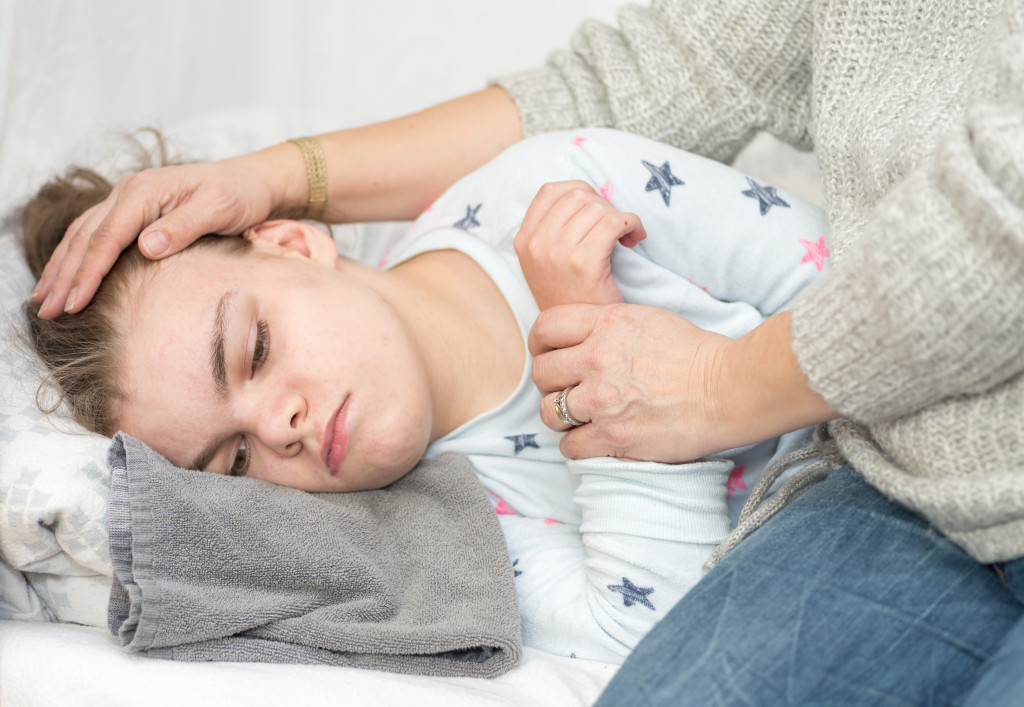As the temperature drops and winter sets in, it’s essential to know how the weather can affect your children’s health. From colds and flu to more serious respiratory illnesses, there are several ways that the winter weather can take a toll on your kids. Here are a few things to watch out for.
Colds and Flu
One of the most common illnesses children experience during the winter is a cold or the flu. These viruses (usually the rhinovirus) are spread through contact with respiratory secretions, such as when an infected person coughs or sneezes. Hand-washing is essential but especially crucial during cold and flu season. Encourage your kids to wash their hands regularly, and ensure they know how to do it properly (scrubbing for at least 20 seconds with soap and water).
If your child comes down with a cold or the flu, you can do a few things to help them feel better. Here are some ways to do that.
Hot Bath
A good hot bath can deal with various symptoms that go with the flu. It can also prevent your child from getting sick in the first place. Consider investing in an affordable two-person hot tub for your home. Using this bathtub, you and your child can enjoy a hot bath during winter. This can be an excellent way to spend time with your child while helping them with their symptoms.
Steam Inhalation
Inhaling steam can help with congestion and breathing issues that come with the flu. Fill a bowl or sink with hot water, have your child lean over it, and cover their head and the bowl with a towel to create a tent for the steam.
Medication
Over-the-counter medications such as ibuprofen or acetaminophen can help with body aches and fever associated with the flu. However, be sure to follow package directions carefully and never give aspirin to children under 18, as it has been linked to a rare but serious illness called Reye’s syndrome.

Respiratory Illnesses
Another illness that is more common in winter is a respiratory infection, such as bronchiolitis or pneumonia. These illnesses usually occur when a cold or flu virus spreads to the lungs. Symptoms include coughing, difficulty breathing, wheezing, and rapid breathing. If your child has any of these symptoms, it’s essential to seek medical attention immediately. Sometimes, hospitalization may be necessary, so your child can receive oxygen therapy and other treatment. Thankfully, there are ways you can keep your child safe from respiratory illnesses. Here are three ways to do that.
Keep Your Home Clean
Cleanliness is one of the best defenses against respiratory illnesses. Make sure to frequently clean and disinfect surfaces in your home, especially during cold and flu season. Here are a few things you’ll need to ensure that your home is clean from any respiratory illness:
- HEPA Filters: These filters are designed to eliminate small particles, including viruses, from the air in your home.
- Disinfectant: Use a disinfectant (such as bleach or alcohol) on surfaces that may harbor viruses. This includes door handles, toilets, and counters.
- Hand-Washing: Encourage your children to wash their hands frequently, especially before eating and after using the bathroom.
Reduce Dust Buildup
Dust in the home can aggravate respiratory illnesses, so it’s crucial to reduce dust buildup. Make sure to wash bedding and blankets regularly and vacuum using a HEPA filter-equipped vacuum cleaner. Also, consider investing in air purifiers for your home to eliminate airborne particles.
Hypothermia and Frostbite
Another concern during winter is hypothermia and frostbite. Hypothermia occurs when your body loses heat faster than it can produce, causing your body temperature to drop dangerously low. Symptoms include shivering, confusion, slurred speech, and loss of consciousness.
Frostbite is a similar condition where body parts (usually extremities) become frozen due to prolonged exposure to cold temperatures. Be sure to dress your children in warm clothing when going outside in the cold. If they start showing signs of hypothermia or frostbite, seek medical attention immediately, as these conditions can be life-threatening if not treated promptly. Lastly, ensure that your home has proper heating. You can heat your home by investing in HVAC systems and insulation. Both of these are important in keeping your family safe during winter.
When the temperatures start to drop, it’s essential to be aware of how the winter weather can affect your children’s health. From colds and flu to more serious respiratory illnesses, there are several ways that the colder months can take a toll on kids. By understanding what illnesses are more common in winter and taking steps to prevent them, you can help keep your child healthy all season long.

